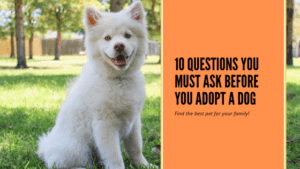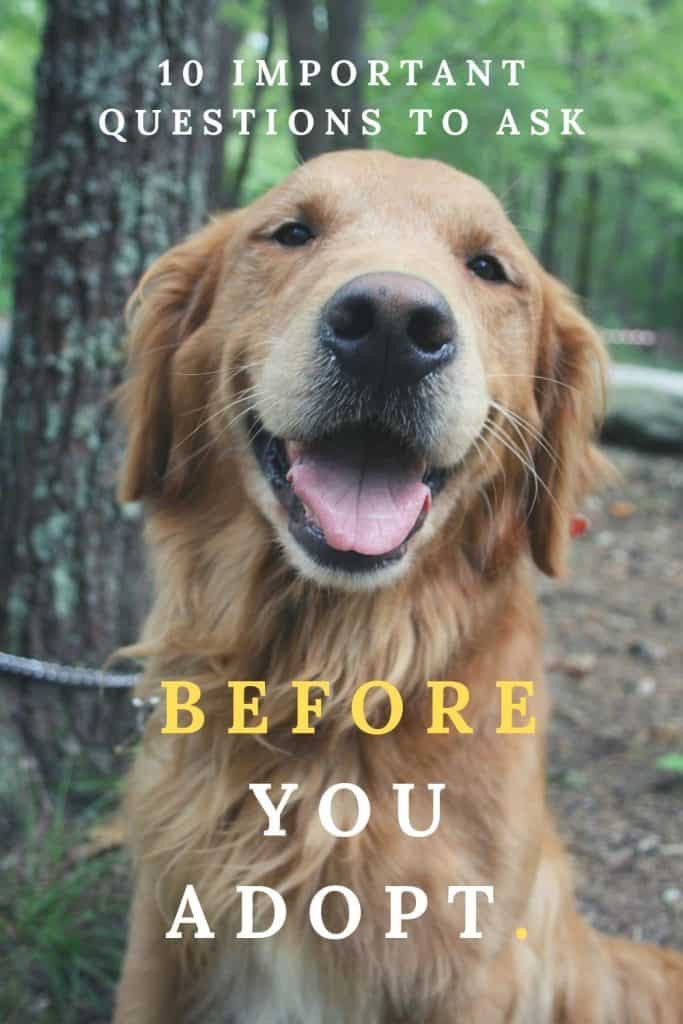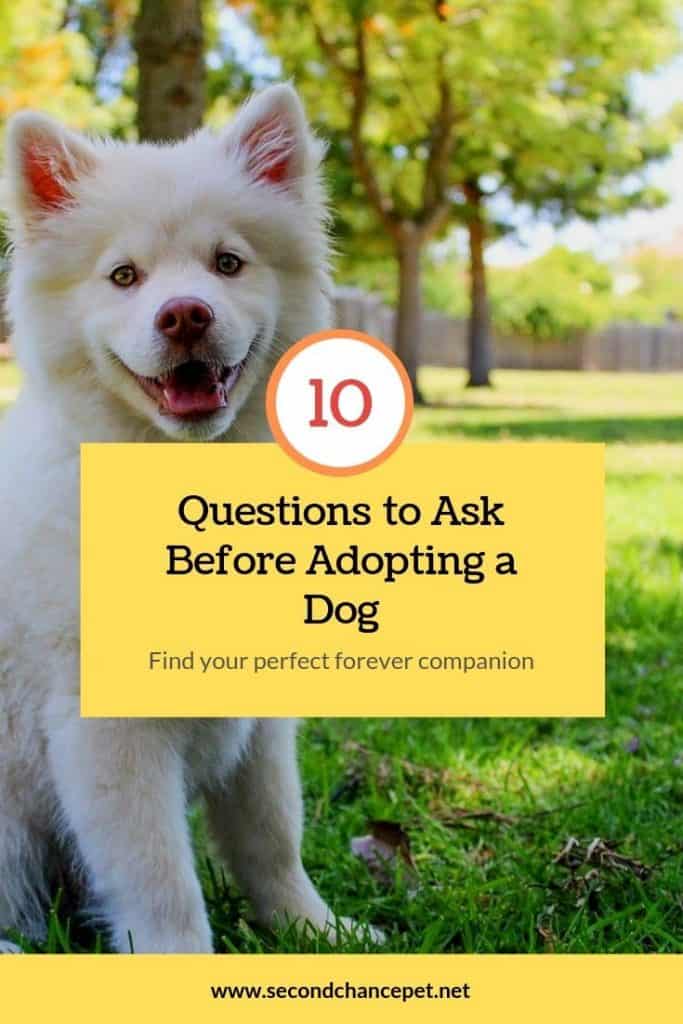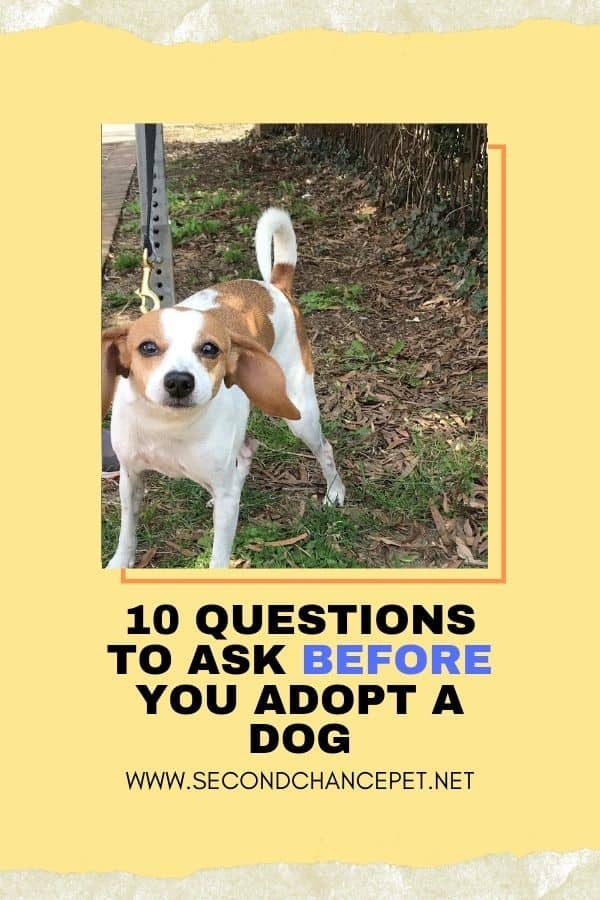 Below are ten questions to ask before adopting a dog. There could be many more, depending on your lifestyle, energy level, and preferences. But the answers to these questions should illuminate a dog’s personality (“doganality”??) and allow you to make the right decision for your family.
Below are ten questions to ask before adopting a dog. There could be many more, depending on your lifestyle, energy level, and preferences. But the answers to these questions should illuminate a dog’s personality (“doganality”??) and allow you to make the right decision for your family.
COMPATIBILITY QUESTIONS TO ASK BEFORE ADOPTING A DOG
1. Has she been around children since she’s been here? Or, did she live with children in her past home? If so, what ages? Were they noisy? How did she react?
This is important to know, even if you don’t have children or grandchildren yourself. You want to at least have a clue whether your new pet will be safe if you take them out. Unless you have kids who visit your home, the answer may not sway you one way or the other. But it’s always good to know if your dog needs to be watched around children when in public.
Bear in mind that many children are not taught the proper way to approach pets. They’ll run up to them suddenly, won’t ask the owner’s permission, and reach for the dog. As the owner, you will need to protect your dog from having a bite history. And, in this litigious society, you will bear the responsibility of injury to the child. If adopting a dog who does not care for children, you will have to be firm in saying “no” to children approaching.
2. How is she with other dogs?
Dogs tend to come in three varieties here.
a. They love other dogs. This is great if you have another dog like this, or don’t have another dog. But these girls can overwhelm dogs who are a little more stand-offish. This is why most shelters require a dog-to-dog meeting with any animals currently in your home. Just as you don’t necessarily like everyone you meet, neither do all dogs. It’s important to match energy and socialization levels of your dogs as well as of your family.
b. They’re dog selective. This can mean many things. They only like female dogs, or only males. They don’t like large dogs, or small ones. They’re not fond of dogs who are excitable, but just fine with ones who do their own thing. Again, a dog-to-dog meeting is a must. You don’t want to get a new dog home only to find your other dog just doesn’t like her.
If the first meeting between canines doesn’t go well (but isn’t horrible, either), you can ask if you can try one more time on another day. My anxious dog got snappy when approached by the dog I was looking at, but her anxiety was caused by the shelter environment, not the dog. When we tried again two days later, everything was fine, and he became our new dog.
c. They don’t like other dogs at all. Surprisingly, many dogs fall into this category. If you don’t have another dog, and are only looking for one, please adopt one of these pups. In my experience (anecdotal), dogs of this nature are the hardest dogs to find adopters for. Even more so that pit bulls, or black dogs, many of these pups end up in shelters for months or even years as the shelter looks for the right family. Yet they often make excellent companions. Animal rescues need to encourage first-time pet owners and families who only want one dog to adopt, rather than buy, a dog.
3. Has he been around cats before? If not, has he been cat tested?
This is vitally important if you own cats. If you don’t have cats, but live in a neighborhood with outside cats, you’ll have to be vigilant when taking your new dog outdoors if he doesn’t like them. Eventually, the local felines will learn to avoid your yard, but you don’t want a tragedy before they’ve had a chance to adjust.
The shelter will not test a dog with your cats, but, if they have both species up for adoption, they will test using shelter cats. You won’t be involved with this, but the staff will be honest in their evaluation. Usually such a test will involve three different feline personalities. First will be a cat who is neither aggressive, nor fearful of dogs; second will be one who runs and hides, and the third (and maybe most important) will hiss and smack the dog. Reactions of aggression and tendency to chase will be observed and reported. If the shelter caters only to dogs, ask how a cat test can be arranged.

PAST HISTORY QUESTIONS TO ASK
4. What is her history?
This is often unknown, especially if the dog was a stray. However, many dogs are owner surrenders for one reason or another, and the shelter should be able to share with you the stated reason for surrender. Don’t take the owner’s reason as necessarily honest, however. People surrendering their animals often make up a reason to avoid judgement. For example, I was involved with an evaluation on a dog whose owners said she suffered from separation anxiety. In our brief meeting, we saw no signs of this, and, upon speaking with the transferring shelter, their staff hadn’t seen any anxiety in the several weeks she had been there. She was adopted fairly quickly, and never suffered any separation anxiety at all.
You will never, and should never, be told anything that would identify the previous owner. In the case of an owner surrender, the shelter will have a completed owner’s assessment which will help you discover more about the dog. Ask if they’ll share the information on the assessment with you.
HEALTH AND MAINTENANCE QUESTIONS TO ASK BEFORE ADOPTING A DOG
5. What are his grooming needs?
If you’re interested in a short-haired dog, this question may be unnecessary. But if you’re looking at a hairy guy, you’ll want to know how you need to approach grooming. Does it need to be done every day, weekly, monthly? Is he good with brushing, or will you need to take him to a professional? The cost of grooming, if you will take him to someone else, should be figured into yearly costs for the sake of your budgeting.
6. Does she have any ongoing medical conditions?
This question is usually answered up-front, but it’s smart to ask again anyway. Bear in mind that some ongoing conditions are neither expensive nor degenerative. For example, an older dog with thyroid issues is handled with an inexpensive daily medication. Should this be the case, however, make sure to include those costs as well in your budgeting.
7. Is he noise phobic?
This is easier to get a definitive answer for in the summer when thunderstorms and fireworks are the norm. Most dogs are at least cautious during thunderstorms, but some are absolutely terrified. Of my two dogs, one sits upright and attentive during the storm. The other needs to be crated because she becomes destructive in her frantic attempts to hide.
Fear of loud noises is no reason for most to decide not to follow-through on an adoption, but this is something that’s good to know BEFORE a storm arrives. Many dogs will be just fine if given a place to snuggle away from the noise and lights. Others will never get over the fear, so it’s smart to have a plan in advance.
PERSONALITY QUESTIONS TO ASK
8. What has his energy level been while at the facility?
Many dogs will become overly excited when meeting a new person. However, just because the dog you’re looking at is bouncing around like a rubber ball at the moment, his normal energy level may be quite different. Speak with the staff. If the shelter has cameras in the kennel area (many do), you can ask if they’ve seen how he behaves after hours.
It’s important you match your new dog’s energy level to your families’. If you’re active, and plan on taking your dog with you on family excursions, you can give a wonderful home to a high-energy dog. If you’re moderately active, enjoy taking your dog for walks, and occasionally on outings, a medium energy pup may be better for you. And, if you’re mostly an indoors person, or have health issues, ask to see senior, or low energy pups. “Too energetic” is often the reason given for owner surrenders. Start your adoption journey off right by choosing the energy level that matches your own.
9. Is he kennel clean?
Don’t ask if the dog is housebroken. Even if he was once, shelters generally don’t have the staff to constantly let the dogs in and out to potty. Also, stress and fear can cause a dog to urinate or defecate more than usual.
Do expect to do some housebreaking when any rescue dog comes into your home. But, if the answer is “yes” to the above question, you know that animal has been house-broken at one time. Reinforcement of previous training will take much less time than starting from scratch.
If the answer to this question is “oh, he’s housebroken”, don’t believe it. A new environment will cause old training to take a backseat, at least for the first few days. Expect, and don’t punish, accidents. Excitedly praise potties in the correct location. (Seriously, over-the-top enthusiasm is called for here.)
AND ONE POLICY QUESTION TO ASK BEFORE ADOPTING
10. Does the shelter have a foster-to-adopt program?
If you haven’t had much experience with adopting a dog, or with dogs in general, or you are a little uncertain if the particular dog you’ve chosen is right for your family, ask about foster-to-adopt. You’ll have to go through the same interview process and approval as if you’re adopting, but the shelter will retain ownership and responsibility for the dog. You will take the dog into your home, just as if you had adopted, and care for him.
This will be a time-limited arrangement. Usually the shelter will give you two or three weeks before you must either return the animal or finalize the adoption. That is enough time to determine whether this dog is the right one for you. If you’ve been approved, and, for some reason, this isn’t the right choice, the shelter will happily work with you to find the best match.
Don’t be afraid to ask questions. This shows that you are taking this decision seriously, and animal shelters appreciate that. If your particular shelter staff member seems impatient or unwilling to take this time with you, ask if you can speak with another person. Many choose a life working with animals in no small part because they’re uncomfortable with social interactions. Don’t take impatience personally, but do ask if there is someone else you can work with.
Here’s hoping you find the perfect four-legged canine to add to your household!
Photo of hairy dog by freestocks.org on Unsplash
Image of dog and cat together by papagnoc from Pixabay
Smiling Golden Retriever Image by sbmatherson from Pixabay
Spitz Image by Spiritze from Pixabay





